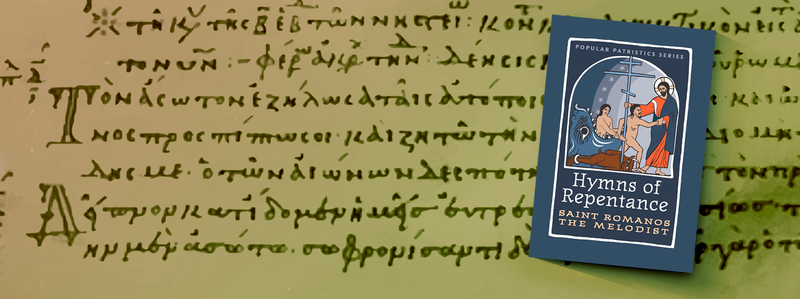Review: Hymns of Repentance
Posted by SVS Press on 23rd Jun 2020
Of the likely hundreds of kontakia, or hymns, composed by St Romanos the Melodist, fifty-nine of his genuine “sermon-poems” survive today, yet he is known mainly as the author of the Akathist Hymn to the Theotokos. Romanos is important because, living in sixth century Byzantium, he brings together a compelling synthesis of Greek poetry, Syriac poetry and hymnody, and the Cappadocian fathers.
Up until now, those who were familiar with his kontakia have had to make do with English translations that have fallen far short in their accuracy from the original Greek. An exception is a selection of Romanos’ hymns translated by the late Archimandrite Ephrem Lash; however, this edition is out of print and difficult to obtain. Now, an excellent new English translation by Andrew Mellas entitled Hymns of Repentance is available through St. Vladimir’s Seminary Press (SVS Press). To be fair, because of the complexity and beauty of Greek, it is hard for any translator to do justice, in English, to the puns, rhymes, and word plays. But what Mellas offers is an accurate translation that is not too literal and does not “straightjacket” the Greek (as another translator put it).
As the title implies, these are hymns on the subject of repentance and, in Romanos’ day, they were likely used during the vigil service on the night before a feast day during Great Lent. The hymns are meant to bring us into the reality of the sacred narrative and to make us the protagonists (which is why they often begin with “Today!”).
Romanos is highly imaginative. He writes very daring and inventive dialogue that doesn’t appear in the Bible, a practice from the Syriac tradition. Remember that this is theology in poetry. It is not dogmatic but doxological. The result is simply exciting. I defy anyone to not have an attack of goosebumps upon reading this kontakion, which shows Satan plotting and planning to entrap Eve:
"Therefore, the enemy mixed a sweet taste with his death-bringing
word, plotting, the bitterest enemy said these things in private:
Unless I mingle my plan with trickery,
if I condemn God by my words,
Eve will at once suspect me of hating God,
and I shall become unacceptable to her,
for until now, I do not know her will.
If I manage to mislead, she might favor me.
Therefore, let me approach with craft those who have received eternal life.”
In this kontakion about the Prodigal Son, Romanos turns the son into Christ and the whole scene into a Eucharistic celebration:
“But now, as I said, sacrifice the virgin calf for the one who
has stumbled, sacrifice the Son of the Virgin,
he who has never been tamed by the yoke of sin;
with eagerness he goes ahead of those who drag him,
for he does not revolt against the sacrifice,
but willingly bows his neck
to those who hasten to sacrifice him.
Drag in, sacrifice, the giver of life,
who is sacrificed and not put to death,
who gives life to those in hell,
so that, as we eat, we may celebrate,
for he was dead, as I said before, and has come to life,
the one on whom I have had mercy, I
the Master and Lord of the ages.”
Repentance is something we talk about a great deal but the words, so often heard, can fail to move us. Hymns of Repentance can help us see repentance with new eyes.
Click here to order a copy of Hymns of Repentance.




